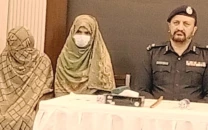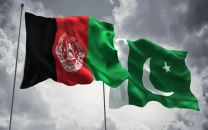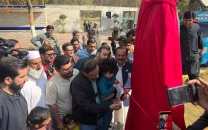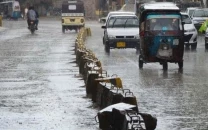‘Indus water system has destroyed lives and cultures’
Speakers at Lahooti Melo call for policymakers to rethink the distribution of water

Lahooti Melo 2020. PHOTO: Lahooti Melo
Water experts, environmentalists and politicians, speaking at a Lahooti Melo session titled 'Whispers of Sindhu: The Struggles of River Indus,' asked the government and policymakers to rethink the water accords and the mighty river's distributary system. The current system, they say, has destroyed centuries-old cultures, washing away villages and displacing entire communities.
According to Dr Abbas, the destruction of the Indus began in the 1850s, when the ruling British authorities began setting up canal colonies in the region. "It has not yet stopped. We want to continue it, even though it has destroyed this river and destroyed the lives, livelihood and cultures of communities."
He highlighted the plight of those living near the Tarbela Dam, who do not yet have even the basic facility of electricity. "These people sacrificed everything 60 years ago. But on paper, they are simply 'affectees' who will be 'given something,'" he added.
There are people in the delta region too whose lives have been upturned because of the dam. "But they are not [officially] recognised as affectees, since they were only affected 50 years later," Dr Abbas pointed out. And, he continued, they were 1,000 kilometres away from the dam too.
Dams, in his view, can be catastrophic - a lesson that many countries in the world have learned after the construction of huge dams. Here, though, the lesson has been overlooked.
Environmentalist Ahmed Rafay Alam concurred, pointing to the Sukkur Barrage - the first man-made instrument on the Indus delta. "And look at the delta a century later!" he said.
An imminent threat
Alam highlighted the looming problem of water scarcity too, adding that water was a provincial issue. "The entire system in the region will be upended by global warming," he explained. "The origin of the Indus River lies in the monsoon and it will be destroyed."
Senator Sassui Palijo focused on water scarcity too, observing that there was no water downstream of Kotri, disturbing Sindh's agricultural sector.
"There was a time when the Indus was the major source of trade between Sindh and different parts of the world," she remarked, adding that now, the Indus Delta - a Ramsar site - was in deplorable condition. "There is no water. There is massive internal migration."
Blaming the current government for not taking Sindh's water scarcity seriously, Sassui said that the parliamentarians believed the water flowing downstream of Kotri barrage was 'being wasted.'
According to her, before the construction of dams and illegal canals, 80 MAF of water was released in winter and 100 to 150 MAF in summer. "This flow of water used to maintain the marine life, biodiversity and ecosystem [of the Indus]."
For the senator, the question of water scarcity was crucial. "We need to work on the basis of war footing, since the country is one of the five most vulnerable nations of the world," she claimed.
In the pages of history
Tracing the Indus River's accords through history, Qaumi Awami Tehreek president Ayaz Latif Palijo said that the 1945 water agreement between Sindh and Punjab was not an agreement between two provinces. "It was an accord between two states," he pointed out, adding that after the Radcliffe Award, Punjab was split into two. "Control over the water lay in India's part of Punjab," he explained.
He added that the 1960 Water Treaty was penned to secure the water share for Punjab in Pakistan. "Sindh was not part of the agreement. Punjab made the accord with India, keeping Sindh away from it," he claimed.
"All the water accords are fraudulent, including the one in 1991," criticised Ayaz, adding that Sindh was not being given the water it was due. According to the 1991 accord, he said, Sindh was to receive 117 MAF of water, but there was less than 90 MAF water in the system for it. "This fraud is not a new phenomenon. We have been observing it since 1947. Where do we lodge this complaint?"
He asserted that no parliament or judiciary had ever heard the case of the Indus River, adding that they had initiated long marches, sit-ins and protests, all in vain. "Where can we lodge this kind of complaint?"
Bringing more than just water
Muhammad Nawaz Shah, another panelist, observed that the river did not carry water alone to Sindh. "It also brings with it silt," he stated, adding that 1.88mm of silt used to be deposited in the Indus delta each year, but the number had now gone down to 1mm - less than the rise in sea levels. This leads to a rise in sea intrusion into the delta.
"The water in the delta system is not drinkable; sometimes, it is not even fit for agriculture," he lamented, saying that the ecosystem had been destroyed.
Going green
Meanwhile, dozens of festival participants, including students from across Jamshoro and Hyderabad, planted trees at the Lahooti Melo's venue, the Mehran University of Engineering and Technology in Jamshoro. This was in line with the theme of this year's Lahooti Melo: 'Eco, Not Ego.'
Horticulturist Toufiq Pasha briefed attendees on how to plant a tree so that it can grow smoothly and support the environment.
Meanwhile, festival founder and organiser Said Samejo disclosed that the trees being planted were all indigenous, including species such as neem, peepal and moringa.
"The land is our mother and we should treat it as our mother. It is time to give back to our motherland," he maintained, adding that everyone should plant trees.
Apart from panel discussions and technical workshops on climate change, global warming and their impact on indigenous communities, the festival also hosted live music sessions, featuring the fakirs of Bhit Shah, Shafi Fakir, Kaif Ghaznavi, Sanam Marvi, Taj Mastani, Fareed Ayaz, Akbar Khamiso Khan and others.
"I travel to Hyderabad every year for the Lahooti Melo," enthused Sughra Batool, a visitor from Karachi. "It is a real combination of music and genuine subjects of discussion and understanding, giving my friends and myself something to learn."
Published in The Express Tribune, February 16th, 2020.


















COMMENTS
Comments are moderated and generally will be posted if they are on-topic and not abusive.
For more information, please see our Comments FAQ